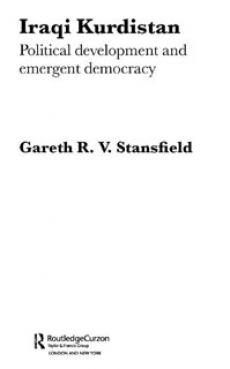| Foreword
Kurdistan is neither a politically defined entity nor a state but an area of some 191,600km2 straddling the boundaries of several countries, notably Turkey, Iran and Iraq. Within the area are some twenty-five million ethnic Kurds and globally, the Kurds probably represent the largest nation in the world to have been denied an independent state. For most of the twentieth century, the Kurds have fought to obtain greater autonomy within their different states, while retaining the ultimate vision of an independent Kurdistan. However, the problems they face differ from state to state and they have been unable to develop a cohesive approach.
Within the area, Iraqi Kurdistan has for more than ten years acted as a de facto state. Located at the crossroads of the world, it is of compelling geopolitical interest and constitutes a key global flashpoint. It is surrounded by states which are actually or potentially hostile: Syria, Turkey, Iran and the remainder of Iraq. However, as a landlocked territory it is dependent upon the goodwill of neighbours for its communication system. It remains part of Iraq and is located on the headwaters of the major rivers but it is ethnically distinct.
The political situation is as fascinating as the geographical. The government, the Kurdish Regional Government (KRG), comprises two units which are totally separate both politically and geographically. Furthermore, each represents one party. Thus, government and party in Iraqi Kurdistan are synonymous. The two key parties: the Kurdistan Democratic Party (KDP) in the west and the Patriotic Union of Kurdistan (PUK) in the east have developed differently and have distinctive regional linkages. Following bouts of interfactional fighting, the two parties have developed a divided system of government since 1996 and, despite a number of upsets, this has remained relatively robust until the present time. Thus, despite the instability engendered by the activities of its neighbouring states, particularly Turkey, and the global focus upon Iraq, there has been stability and the possible initiation of what might be considered consociation.
This book examines all the main issues: geographical, political and geopolitical in detail and provides a wealth of accurate detail and insight unavailable in any other volume. The author, Dr Gareth Stansfield, worked for most of the period 1997–2000 on a variety of projects in Iraqi Kurdistan. This continuous presence on the ground together with his own geographical and political expertise allowed Gareth to develop close links with every department throughout the KRG. He also worked closely with the United Nations and a variety of other agencies and nongovernmental organizations. Above all, he developed close personal relationships with the leadership of both the KDP and the PUK. Indeed, I heard both Massoud Barzani and Jalal Talabani refer to him as the most knowledgeable person on Kurdish governmental affairs. Using his own considerable research and in particular the results of detailed interviews throughout his network, Gareth has produced a treatise which is both formidable in its content and timely in its appearance.
For the past twelve years, Iraq has seldom been far from world headlines and at present media interest is intense. Therefore, any authoritative account of Iraqi Kurdistan is of interest. However, the importance of the book is enhanced by the fact that the Kurds form the core of the internal opposition to Saddam Hussein and the de facto state itself provides a possible model for a future democratic federal state of Iraq. The present political position in Iraqi Kurdistan results, in great measure, from the way in which the two major political parties have evolved. This is considered in detail, illuminated by interviews with many who have taken part in critical events. The contemporary situation of the two parties is assessed, in particular their approaches to government. The structure and modes of decision making within both parts of the KRG are then described in detail and evaluated. Little of this material has previously been recorded with such detail and accuracy.
The result is a compelling volume which fills a major gap in the literature but, more important, will serve as a significant guide for forthcoming events in Iraq. As the future unfolds, the Kurds and Iraqi Kurdistan are likely to be central in the affairs of greater Iraq.
Ewan Anderson
Emeritus Professor of Geopolitics
University of Durham | 